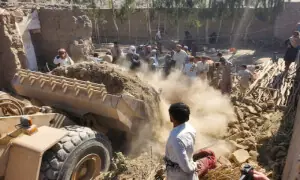As the Taliban returns, 20 years of progress for women looks set to disappear overnight
4 min readAs the Taliban takes control of the country, Afghanistan has again become an extremely dangerous place to be a woman.
Even before the fall of Kabul on Sunday, the situation was rapidly deteriorating, exacerbated by the planned withdrawal of all foreign military personnel and declining international aid.
In the past few weeks alone, there have been many reports of casualties and violence. Meanwhile, hundreds of thousands of people have fled their homes. The United Nations Refugee Agency says about 80% of those who have fled since the end of May are women and children.
What does the return of the Taliban mean for women and girls?
The Taliban took control of Afghanistan in 1996, enforcing harsh conditions and rules following their strict interpretation of Islamic law.
Under their rule, women had to cover themselves and only leave the house in the company of a male relative. The Taliban also banned girls from attending school, and women from working outside the home. They were also banned from voting.
Women were subject to cruel punishments for disobeying these rules, including being beaten and flogged, and stoned to death if found guilty of adultery. Afghanistan had the highest maternal morality rate in the world.
With the fall of the Taliban in 2001, the situation for women and girls vastly improved, although these gains were partial and fragile.
Women now hold positions as ambassadors, ministers, governors, and police and security force members. In 2003, the new government ratified the Convention on the Elimination of all Forms of Discrimination Against Women, which requires states to incorporate gender equality into their domestic law.
The 2004 Afghan Constitution holds that “citizens of Afghanistan, man and woman, have equal rights and duties before the law”. Meanwhile, a 2009 law was introduced to protect women from forced and under-age marriage, and violence.
According to Human Rights Watch, the law saw a rise in the reporting, investigation and, to a lesser extent, conviction, of violent crimes against women and girls.
While the country has gone from having almost no girls at school to tens of thousands at university, the progress has been slow and unstable. UNICEF reports of the 3.7 million Afghan children out of school some 60% are girls.
Officially, Taliban leaders have said they want to grant women’s rights “according to Islam”. But this has been met with great scepticism, including by women leaders in Afghanistan. Indeed, the Taliban has given every indication they will reimpose their repressive regime.
In July, the United Nations reported the number of women and girls killed and injured in the first six months of the year nearly doubled compared to the same period the year before.
In the areas again under Taliban control, girls have been banned from school and their freedom of movement restricted. There have also been reports of forced marriages.
Women are putting burqas back on and speak of destroying evidence of their education and life outside the home to protect themselves from the Taliban.
As one anonymous Afghan woman writes in The Guardian:
I did not expect that we would be deprived of all our basic rights again and travel back to 20 years ago. That after 20 years of fighting for our rights and freedom, we should be hunting for burqas and hiding our identity.
Many Afghans are angered by the return of the Taliban and what they see as their abandonment by the international community. There have been protests in the streets. Women have even taken up guns in a rare show of defiance.
But this alone will not be enough to protect women and girls.
Currently, the US and its allies are engaged in frantic rescue operations to get their citizens and staff out of Afghanistan. But what of Afghan citizens and their future?
US President Joe Biden remains largely unmoved by the Taliban’s advance and the worsening humanitarian crisis. In an August 14 statement, he said:
an endless American presence in the middle of another country’s civil conflict was not acceptable to me.
And yet, the US and its allies — including Australia — went to Afghanistan 20 years ago on the premise of removing the Taliban and protecting women’s rights. However, most Afghans do not believe they have experienced peace in their lifetimes.
As the Taliban reassert complete control over the country, the achievements of the past 20 years, especially those made to protect women’s rights and equality, are at risk if the international community once again abandons Afghanistan.
Women and girls are pleading for help as the Taliban advance. We hope the world will listen.
For the latest news, follow us on Twitter @Aaj_Urdu. We are also on Facebook, Instagram and YouTube.



























Comments are closed on this story.